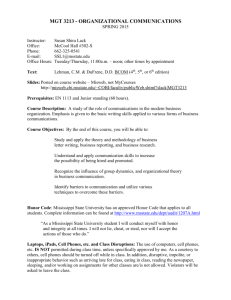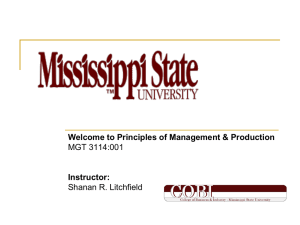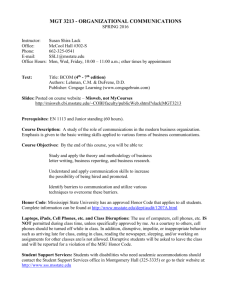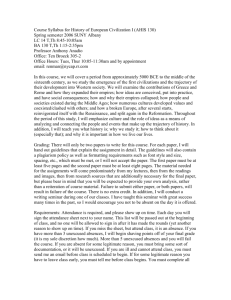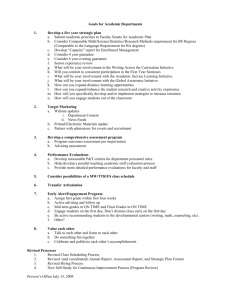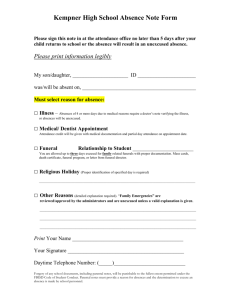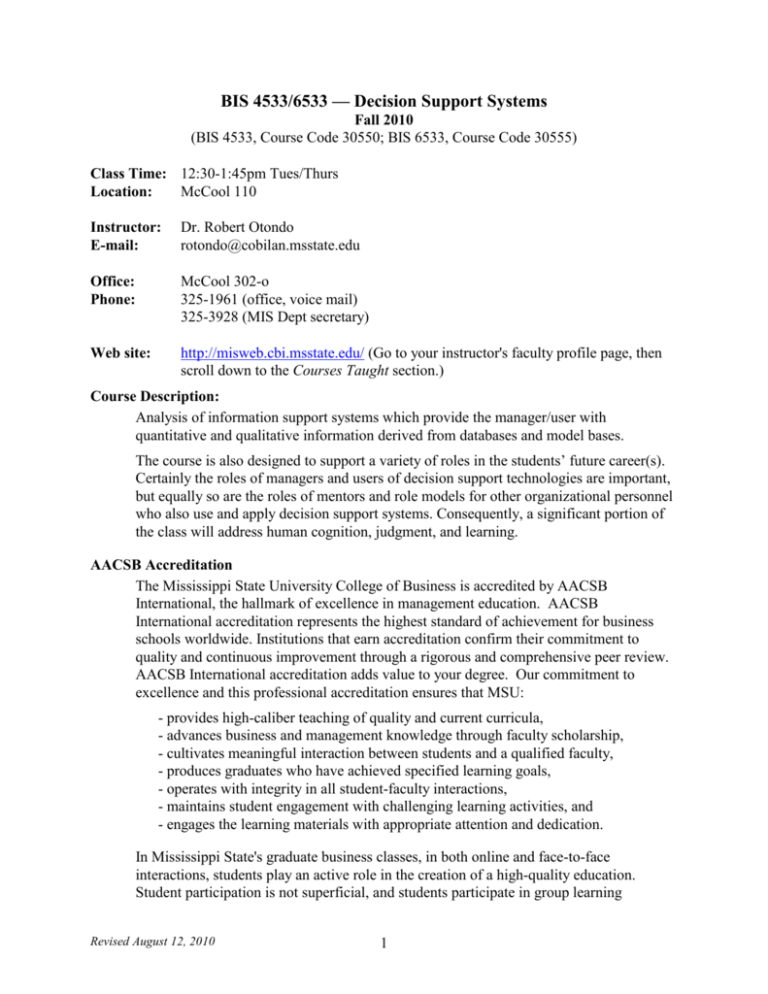
BIS 4533/6533 — Decision Support Systems
Fall 2010
(BIS 4533, Course Code 30550; BIS 6533, Course Code 30555)
Class Time: 12:30-1:45pm Tues/Thurs
Location:
McCool 110
Instructor:
E-mail:
Dr. Robert Otondo
rotondo@cobilan.msstate.edu
Office:
Phone:
McCool 302-o
325-1961 (office, voice mail)
325-3928 (MIS Dept secretary)
Web site:
http://misweb.cbi.msstate.edu/ (Go to your instructor's faculty profile page, then
scroll down to the Courses Taught section.)
Course Description:
Analysis of information support systems which provide the manager/user with
quantitative and qualitative information derived from databases and model bases.
The course is also designed to support a variety of roles in the students’ future career(s).
Certainly the roles of managers and users of decision support technologies are important,
but equally so are the roles of mentors and role models for other organizational personnel
who also use and apply decision support systems. Consequently, a significant portion of
the class will address human cognition, judgment, and learning.
AACSB Accreditation
The Mississippi State University College of Business is accredited by AACSB
International, the hallmark of excellence in management education. AACSB
International accreditation represents the highest standard of achievement for business
schools worldwide. Institutions that earn accreditation confirm their commitment to
quality and continuous improvement through a rigorous and comprehensive peer review.
AACSB International accreditation adds value to your degree. Our commitment to
excellence and this professional accreditation ensures that MSU:
- provides high-caliber teaching of quality and current curricula,
- advances business and management knowledge through faculty scholarship,
- cultivates meaningful interaction between students and a qualified faculty,
- produces graduates who have achieved specified learning goals,
- operates with integrity in all student-faculty interactions,
- maintains student engagement with challenging learning activities, and
- engages the learning materials with appropriate attention and dedication.
In Mississippi State's graduate business classes, in both online and face-to-face
interactions, students play an active role in the creation of a high-quality education.
Student participation is not superficial, and students participate in group learning
Revised August 12, 2010
1
experiences. All students are expected to perform to standards set by leading faculty, and
to contribute to the learning of others.
Study Materials:
Textbooks:
Decision Support and Business Intelligence Systems, 8th edition, by Efraim Turban, Jay
E. Aronson, Ting-Peng Liang, and Ramesh Sharda. Published by Pearson Prentice Hall,
2007. ISBN 0-13-198660-0. [NOTE: There is a 9th edition, but we will use the 8th]
Suggested References (Not required; available in the Reserve Section of Library):
Judgment in Managerial Decision Making, 6th edition, by Max H. Bazerman. Published
by Wiley & Sons, 2006. ISBN 0-471-68430-9. (2nd edition available in Reserve Section
of Mitchell Library).
Readings:
Smith, G. F. (1988). Towards a heuristic theory of problem structuring. Management
Science 34(12), pp. 1489-1506.
Smith, G. F. (1989) Defining managerial problems: A framework for prescriptive
theorizing. Management Science 35(8), pp. 963-981.
Smith, G. F. (1995). Classifying managerial problems: An empirical study of definitional
content. Journal of Management Studies 32(5), pp. 679-706.
Other readings from academic journals and practitioner (i.e., “trade”) magazines may be
assigned throughout the class.
Prerequisites:
BIS 3233 (Intro to MIS) or graduate standing.
Grading:
The following table shows the allocation of the weights that will be assigned in
calculating the final grade.
Exam #1
Exam #2
Exam #3 (Final)
Projects
Project 1: Linear Programming
Project 2: Data Visualization
Project 3: Data Mining
Project 4: Collaboration
Project 5: Expert Systems
Subtotal
Attendance and Participation
Total
20%
20%
20%
8%
4%
5%
8%
5%
30%
10%
100%
Exams
Revised August 12, 2010
2
Exams are composed of multiple choice and essay questions. Essay questions are
intended to test conceptual knowledge. Depth of understanding is a critical factor in the
assessment of responses. Shallow answers will be awarded fewer points. Questions will
be re-graded upon request; however, such a request will mean the entire exam will be regraded.
Extra Credit
Extra credit assignments to increase a student's grade are not available. However,
individualized help is available during office hours or other appointments to help the
student prepare for future exams and assignments.
Incomplete (“I”) Grades
The policy for incomplete undergraduate grades follows guidelines sent to MSU faculty
by Provost Peter Rabideau on August 6, 2008. The guidelines are as follows:
“TO:
Academic Deans and Department Heads
FROM:
Peter Rabideau
Provost and Vice President
for Academic Affairs
SUBJECT: Assigning "I" Grades
The policy regarding the assignment of an "I" (Incomplete) grade for
undergraduate courses is as follows:
A grade of "I" (Incomplete) may be submitted in lieu of a final grade when the
student, because of illness, death in his or her immediate family, or similar
circumstances beyond his or her control, is unable to complete the course
requirements or to take final examinations. A grade of "I" may not be
submitted for reasons other than previously described, and an "I" grade may
not be given to extend the semester so that a student may complete a required
assignment(s). [emphasis added]
Undergraduate students who receive an "I" grade must complete all work within
thirty (30) calendar days from the date of the student's next enrollment. A
student who receives an "I" grade may make up only that part of course work
not completed because of the emergency. If a grade of "I" is not resolved
into a passing grade within the allotted time, the grade becomes "F." Once a
grade of "I" has been converted to an "F" because of the student's failure to
complete the necessary coursework or a lapse of the allowable time, no
additional grade change will be allowed except under extreme circumstance(s)
as recommended by the deans and approved by the Vice President for Academic
Affairs.
Revised August 12, 2010
3
If an undergraduate student has not enrolled in the university within a year
of receiving a grade of "I," the "I" will be converted to a permanent grade
of "WI" and the student will not have the opportunity to change that grade.
Please inform all faculty members in your college/school/department of this
policy and the importance of following it. Exceptions to this policy should
be discouraged. However, if any exceptions are considered, they must be
approved by the faculty member's department head and dean, and copies of these
approvals placed on file in the dean's office.
If you have any questions regarding this matter, please feel free to let me
know. Students are being asked to report any violation of this policy to the
Office of Academic Affairs (Telephone: 325-3742).”
The policy for incomplete graduate grades follows guidelines from the MSU Academic
Operating Policy and Procedure (revised 11/25/2005; retrieved from
http://www.msstate.edu/dept/audit/1212.html on 3/18/2010). The guidelines are as
follows:
“Graduate students who receive a grade of “I” must complete all work no later than
the last day of class of the next semester (excluding summer) whether the student is
enrolled or not. Failure of graduate students to remove an “I” grade during the
specified time will result in an automatic grade of "F”. Once a grade of “I” has been
converted to an “F” because of a student’s failure to complete the necessary
coursework or a lapse of the allowable time, no additional grade change will be
allowed except under extreme circumstance(s) as recommended by the deans and
approved by the Vice President for Academic Affairs. “I” grades are not permitted for
thesis and dissertation credits.”
Letter Grades:
Your final average will be calculated to one decimal place, with standard rounding, and
final letter grades will be calculated on a 10-point scale. This means that 89.94 will round
to 89.9, which is a B, and 89.95 will round to 90.0, which is an A.
Preparation for class:
You are responsible for being prepared for each class meeting. The Course Outline shows
the subject for each class meeting. If the day's schedule shows a chapter or section from
one of our books, you should read that material prior to class.
Class Participation:
You are encouraged to participate in class! Interviewers sometimes say that
communications skills are a problem area for some of our graduates. I encourage you to
work on your communications skills in this class. Ask questions. Answer questions.
Volunteer. Be bold. Go for it!
Revised August 12, 2010
4
Classroom Etiquette:
Please get to class on time, and remain seated, reasonably quiet, and attentive throughout
class if possible. Don't start packing up your belongings until class is over.
If you have a pager or cell phone, please turn it off while you are in class to avoid
disruptions.
Do not let your cell phone ring during class!
Absences and Tardiness
The University’s policy on absences can be found on p. 21 of the Bulletin of The
Mississippi State University. A .pdf copy of the Bulletin is available at
http://www.msstate.edu/dept/registrar/bulletin/2006/2006Bulletin.pdf). This policy states
that “Instructors shall record and report the absences of all students on both the midterm
(where applicable) and final grade reports submitted to the Registrar. While some may
consider this policy demeaning, it does appear to have a positive effect by increasing
levels of grade achievement, graduation rates, and retention levels, as reported by an email (dtd. 8/16/06) from MSU President Robert Fogelsong.
I will take roll at the beginning of most classes. If you are not present when I take roll and
you cannot provide valid documentation supporting your excuse, you will be given an
unexcused absence/late arrival. You are allowed one “free” unexcused absence/late
arrival before a 3% penalty for each unexcused absence/late arrival is assessed on the
final course grade. For example:
1 unexcused absence/late arrival = 1 “free” = no point deductions
2 unexcused absences or late arrivals = 1 “free” and 1 assessed = 3% deduction
o A final total course grade of 91% would be reduced to 88%.
3 unexcused absences or late arrivals = 1 “free” and 2 assessed = 6% deduction
o A final total course grade of 91% would be reduced to 85%.
Students will also be assessed an absence if they leave class early without a valid excuse.
Habitually leaving class early to go to work is NOT a valid excuse. Please make
appropriate arrangements with your employer.
Student who audit BIS 4533 or 6533 are held to the same attendance and participation
standards. Auditing students with three unexcused absences will not receive an “AU”
grade.
Academic Integrity:
Mississippi State University has an approved Honor Code (available at
http://students.msstate.edu/honorcode/) that applies to all students. The code is as
follows:
"As a Mississippi State University student I will conduct myself
Revised August 12, 2010
5
with honor and integrity at all times. I will not lie, cheat,
or steal, nor will I accept the actions of those who do."
Please be aware that plagiarism (e.g., copying material from the World Wide Web
and placing it in your work without proper citation) amounts to stealing others’
ideas and passing them off as your own. Thus, plagiarism violates the MSU Honor
Code. If you have any questions about how to reference WWW or other material,
please ask the instructor.
Upon accepting admission to Mississippi State University, a student immediately
assumes a commitment to uphold the Honor Code, to accept responsibility for learning,
and to follow the philosophy and rules of the Honor Code. Students will be required to
state their commitment on examinations, research papers, and other academic work.
Ignorance of the rules does not exclude any member of the MSU community from the
requirements or the processes of the Honor Code. For additional information please visit:
http://www.msstate.edu/dept/audit/1207A.html.
You are expected to maintain the highest levels of academic integrity in this class. All
work that you submit must be your own, original work, done specifically for this class,
this semester. That means that you should not copy anyone else's work, you should not
use work that you did for another class, you should not use work that you did for this
course during a previous attempt in the course, etc. If you ever have any question as to
whether something is acceptable or not, please ask your instructor! Any academic
misconduct will be handled in the manner prescribed in the university regulations.
This policy does not, however, prohibit you from seeking advice from or providing
assistance to other students. Teaching others is often the best way to learn. As you explain
your understandings, you get a better grasp of what you know—and can explain on an
exam—and what you don’t know and/or can’t explain. There is a fine line between
“cheating” and “helping,” so if you’re in doubt about whether you are “crossing the line”
please refer your colleague to the instructor.
Projects:
Undergraduates
Three projects will be assigned during the semester. The first project involves the use of
linear programming (i.e., LINDO 6.1) to model and solve structured/deterministic
business problems. The second and third projects involve business intelligence (i.e., data
warehousing, business analytics, and visualization) using IBM DB2 and Intelligent Miner,
and a new package called Tableau. The fourth project involves collaborative and social
networking software (i.e., Lotus Connections 2.0), while the fifth involves the
construction of an expert system using Microsoft Visual Basic 6.0.
All five projects can be group projects, with a preferred membership of four students per
group. It is imperative that students in a group work together, displaying both a
spirit of cooperation within a collaborative environment and a dedication to
professional conduct.
Revised August 12, 2010
6
Project descriptions will be distributed later in the semester.
Graduates
Graduate-level projects will build upon undergraduate projects. In addition to the
technical material covered in undergraduate projects, most graduate-level projects will
also include discussions relating to the management of the particular DSS topic at hand.
Managerial issues can be drawn from—but are not restricted to those described in Smith
(1995).1 Discussions of managerial issues must be at least three pages long, doublespaced in 12 point font with 1” margins. They should draw upon relevant information
systems and/or decision support systems literature, and can include academic or trade
journal references.
Project descriptions will be distributed later in the semester. Ph.D. students will be
required to participate in the graduate projects.
Doctoral Students:
Doctoral students will meet with the instructor about 4-6 times to discuss readings in
decision support systems. We will need to choose a convenient time.
Registering for misweb.cbi.msstate.edu:
This class uses the "misweb system" for course management. Your first step in using
misweb is to "register" for the system. To do this, go to:
http://misweb.cbi.msstate.edu/editor
Enter your Banner net id, such as abc123, and your Banner net password. Click on the
Log in button. If you have already registered for misweb, you will go straight to your Edit
Routine. If you have not previously registered for misweb, you will go to a short form
which will allow you to register. Complete and submit the form.
Register for misweb immediately!
The misweb system gives you a password-protected account that you can use to publish
an online student profile page that is accessed through the COBI web site. You need to
publish a good page as part of that site, if only to provide your instructor with information
about your background. This system is intended to help you provide valuable information
to instructors, fellow students, employers, and anyone else who visits COBI’s web site.
To go to the misweb system in the future, go to: http://misweb.cbi.msstate.edu
Course Web Site:
We have both a Public Course Web Site and a Private Course Web Site. The Public site
includes items that we make available to the entire world. The Private site includes
everything that is on the Public site, plus links to items that are restricted to students in
our class. In general, you will want to access the Private site. To access the Private
Course Web Site, check your grades in the Online Gradebook System.
1 Smith, G. F. (1995). Classifying managerial problems: An empirical study of definitional content. Journal of
Management Studies 32(5), pp. 679-706.
Revised August 12, 2010
7
1.
2.
3.
4.
5.
Go to http://misweb.cbi.msstate.edu
Go to your teacher's faculty profile page
Scroll down to the Courses Taught section
Click on any link to Online Grades.
Select your class from the list of online gradebooks, enter your net id and your net
password, and click on the Continue button.
6. Once you log in, you will see a page which contains various buttons, for various
course technology components, including your online grades, the private course
web site, and more.
Revised August 12, 2010
8


